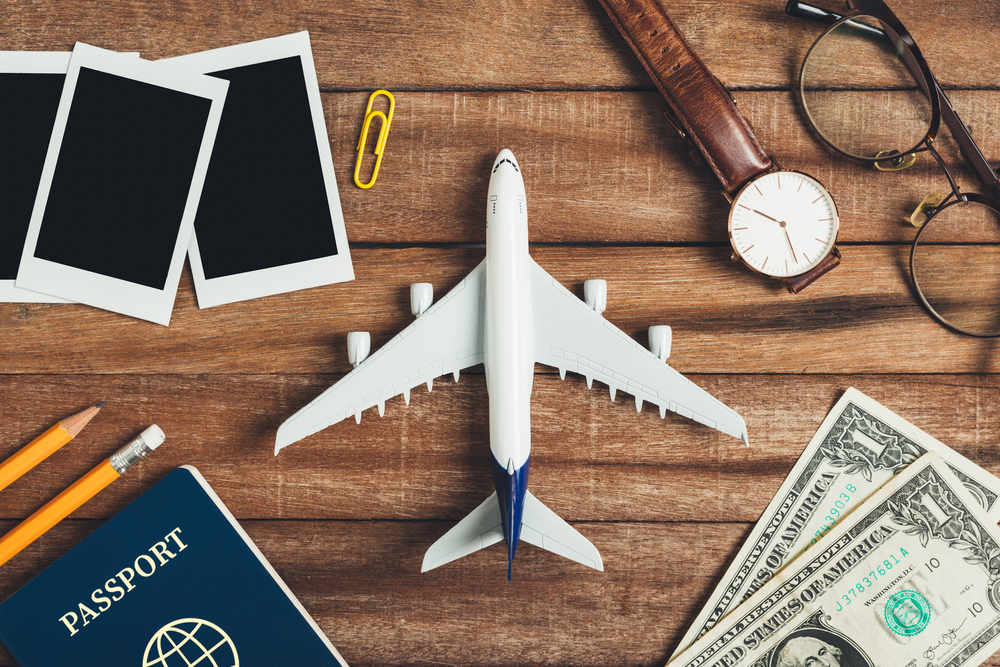5 Ways to Make Your Next Vacation Happen
by Mason Kirchubel, Service Representative
Who doesn’t like a vacation? Who doesn’t need a vacation? You get to where you’re going and time seems to stop, right? Not really. In fact, before you know it, that week you spent in Hawaii is gone. It’s not uncommon for us to learn many families that dream of going on a vacation have trouble saving enough to go on one and when they do get there, most of the time is spent fretting about finances. Having just returned from a wonderful vacation to Asheville, North Carolina, I felt it was pertinent to pass on some things that helped my family plan.

Below are 5 tips that can greatly reduce the stress that goes into planning – and ultimately executing – a family vacation.
5 Ways to Make Your Next Vacation Happen
Budget and pay ahead.
Budgeting and paying for things ahead of time can help you avoid spending all your available funds on attractions and excursions. This allows you to use the fluid funds for things like dining, souvenirs and transportation. It also reduces the amount of money you need to spend and carry while you’re on vacation. When you can, purchase tickets for the things that you know you want to do while in the planning stages of your vacation. This also helps structure your days so that you aren’t spending the first few hours of your day figuring out what you want to or can do. Or even worse, wandering aimlessly and spending unnecessary money. You can also use the tickets you have purchased as a daily schedule so that you don’t pack too much in or overlap attractions. Of course, when you get to your vacation destination, you will find the hidden gems and small towns that may have been overlooked in the planning process, and that’s fine too.
Plan your days.
This leads to another important part of executing the best vacation: scheduling your days. Depending on your scheduling preferences, this can be anything from a strict, hourly breakdown to a more general, overall schedule for the day. For example, on a recent vacation of my own, I took the suggested time spent at attractions (anywhere from 1.5 hours at some, to 6+ hours at other, all-day attractions) and used that as a guide to what we would do each day. By giving yourself a timeline of what you want to do on your vacation, you can avoid spending money on things that you might not have time to fully enjoy, and use that time to focus on the things you have planned and already paid for instead. It’s important to remember to account for drive time, when applicable, between the attractions and excursions, so that you don’t feel rushed to get through the last few hours of the day before things start closing down.
Research the area.
Nothing is worse on vacation than being bored. Sure, there are times where you just want to sit on the beach or by the resort pool and relax, especially if the vacation is a road trip consisting of hundreds of miles. However, vacation can be lost in the relaxation period and you can miss out on some really cool things! Look for things to do around the area. Chances are, there are a ton of smaller attractions, local restaurants, or shopping spots that are known only to the locals - and I’m here to tell you: those are the best places to find. You can go anywhere and find fine dining cuisine, but if you dig around and talk to the locals, you can find the place with from-scratch biscuits and gravy flights. I’m looking at you, Biscuit Head in Asheville, NC. You may be tempted to find a chain restaurant such as Applebee’s or Cracker Barrel. SKIP THOSE PLACES! You can go to any of those at home. The places that the locals frequent are the places that can have a huge impact on your vacation without having much of an impact on your budget. Those places typically take a few hours to complete and won’t eat into your schedule too much. These stops are great for quick lunches at local cafés and diners, shopping for souvenirs, and stretching your legs after what could be a long drive.
Be flexible.
It’s a fact of life that nothing is completely within our control. Situations are even less in our control when we’re 2,000 miles away from home and – without anyone to help us – it can be very scary. But if you keep an open mind and remember the old adage, “Prepare for the worst, but expect the best,” You can put your mind at ease knowing that you have a backup plan. Whether it’s inclement weather, traffic, or something more serious, like car troubles or health concerns, it’s always good to have a contingency plan. Give someone back home a copy of your itinerary and contact information for any lodging you will be staying at. This will give you the ability to contact anyone in the event of an emergency and also gives the people back home a way to contact you for any reason. When you and your family are out and about, be mindful of traffic delays in any of the bigger cities you might be visiting, and always check for alternate routes and detours before you leave. Don’t end up like I once did and get lost in Ohio at 5:30 in the morning trying to find the way back to I-74. It’s not the most calming way to start a road trip!
Travel cards can be your friends.
I say this very cautiously, because credit cards can be a very touchy subject for people. That being said, when used correctly a credit card can get you well on your way to paying for part of your vacation. One of the benefits of using a credit card – in this case, a travel card – are the various rewards in miles, cash back and rebates that travel cards offer. (Did you know that our 3Rivers Platinum credit card offers travel rewards? Learn more here!) If you have such a card and are planning a vacation, using the card can help pay for the airline tickets, rental cars and even lodging! Throughout the year, try using your travel card for smaller purchases like eating out, or fueling up. That way, you can keep the credit card payments relatively low (or even better, paid off every month), all while adding up those reward points and miles that can be used to drastically reduce the out-of-pocket costs of one of the largest chunks of your vacation budget. It is important to remember to make sure you have the money before you use the credit card when using it for vacation. In this usage of a travel card, the goal is to reap the rewards, not use the card in lieu of having the money with the goal of repaying it back. You don’t want to go further in debt trying to go on vacation.
These are just five tips to help guide you and your family to the perfect vacation – making it as enjoyable and stress-free as all vacations should be! While they cover a broad range of topics, there are many other things to take into account when planning your own vacation.
Learn more: 10 Money-Saving Travel Tips | Leaving the State? Let Your Credit Union Know! | 3Rivers Members Can Bank Anywhere in the USA for Free! | How Long Will It Take Me to Save for Vacation? | On Being a Thrifty Tourist | 9 Ways to Save on Holiday Travel | Staying Healthy on the Go | 15 Ways to Save for Vacation | 16 Ways to Eat Cheap & Save on Food While on Vacation | How to Prepare for a Relaxing Return Home from a Trip
